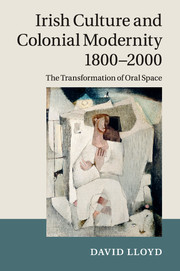Chapter 6 - On extorted speech
back to How It Is
Published online by Cambridge University Press: 07 October 2011
Summary
The first stirrings of a general transformation of late-twentieth-century subjectivity, which Sands limned in his vernacular refunctioning of a generic script of modernity, were registered with singular force by an earlier Irish writer, Samuel Beckett. Few critics have engaged with the prominent place assumed by scenarios of interrogation, incarceration and even of torture, both psychological and physical, in Beckett’s later work. Yet from Godot’s Lucky to the unnamed personages of What Where, his plays resonate with the voices of those subjected to the coercion of their speech, as if the figures in these works both literalized and generalized the predicament of the artist that Beckett famously defined, in the aftermath of the Second World War, as the ‘obligation to express’, even where there is ‘nothing to express, nothing with which to express, nothing from which to express, no power to express, no desire to express’. In the wake of The Unnamable, too, Beckett’s prose work seems overtaken by another scenario, counterpart to interrogation, that of the trial, a scene apparently first sketched in the rather Kafkaesque parable ‘As the Story was Told’. The monological quartet of self-recorders, Molloy, Moran, Malone and the Unnamable, give way to the couple of Texts for Nothing – court clerk or scribe and accused.
At the threshold between the Texts and the late plays stands Beckett’s last long prose work, disintegrative and extreme in its form as in its matter, How It Is (Comment C’est, as it was first published in French in 1961). This work integrates both the scenario of interrogation and that of the scribe-accused in an endless inferno where the tortured become the torturers and the scribe – Krim or Kram – records the ‘extorted voices’ of those who themselves seem to do no more than cite a voice that envelops and enters them where they crawl in the mud. Probably Beckett’s most desolate, unrelievedly abysmal text, one which, unlike the later plays, offers little of the breath-taking formal beauty that counterpoints the misery of their situations, How It Is pushes to the limit his exploration of the condition of what Kant would describe as the pathological subject: the subject that undergoes rather than the subject that is sovereign. It is for that reason that I turn to this text to continue to elaborate the ‘new thing that has happened, or the old thing that has happened again’ in our own time, the emergence of a subject pathologically determined through the imaginary relation to torture.
- Type
- Chapter
- Information
- Irish Culture and Colonial Modernity 1800–2000The Transformation of Oral Space, pp. 198 - 220Publisher: Cambridge University PressPrint publication year: 2011



